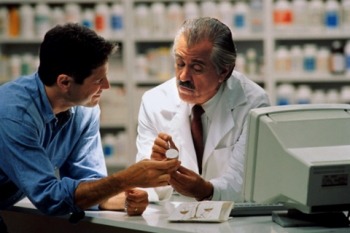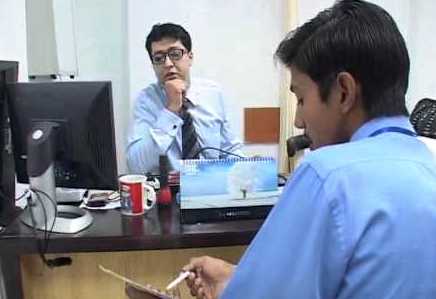They come across as urbane and upbeat young professionals carrying bags full of freebies around health centres. But behind their sophisticated vocation, many medical representatives admit doing ‘dirty jobs’ for doctors to secure big pharmaceutical deals.
Before spitting and lighting up another cigarette in rage, he gave a mouthful to a reluctant doctor avoiding his phone calls for last three days. After a month-long toil, the young medical representative (MR) was finally supposed to secure the much-awaited medicinal deal with a well-known doctor in the summer capital, Srinagar.
But even after bearing the cost of the doctor’s entire family’s monthly bills, the MR began to understand: The doctor wants more.
While his phone kept ringing, another fresh-faced, immaculately-dressed young man showed up at the door of a doctor in Srinagar’s SMHS. His entry turned the doctor with a stethoscope around his neck attentive.
The young MR introduced himself as Aabid, who had come to make a deal for the medicine company he works for. But before he could strike a deal, the doctor tells him, “I’ve already signed a contract with another medical firm for the next six months! I’m booked.”
The debonair young professional makes a face and walks out with a bagful of ‘gifts’ he had brought for the doctor.
Aabid’s growing class often make their presence felt around the health centres across Kashmir. They appear to be well-groomed, gifted with good personalities. Usually in their 20s, they routinely carry a bagful of personal ‘gifts’ and other promotional tools for doctors for prescribing the chosen medication to the patients.

While doctors struggle to make a choice, these MRs make the business more tempting by increasing the doctors’ price and producing convincing ‘gifts’ to let them prescribe the medicines confidently.
And sometimes, it even happens as the patient is present, inside clinics or wards. The patients believe it is a deal which might pave way for cheaper medicines for their treatment.
“But it’s always not so easy,” says Imran Shah, a Srinagar-based MR, working for a prominent Indian pharmaceutical company. “At times, we’ve to literally beg before doctors to secure business.”
As a greenhorn, some four years ago, when he was oblivious of the ugly nuances involved in his job, he saw some of his colleagues holding their chins and pleading before doctors inside their clinics: “Sir, please! Make it happen. Otherwise, I’ll lose my job.”
Shah says, being a successful MR is to be a shrewd salesman, who has to go the extra mile to woo the best doctors in town for big business.
“At the end of the day,” he says, “it doesn’t matter how ethically you do this job. What matters is business. And to get that, we often have to appease the doctors with different items and gifts.”
When teenager Rayan got an iPhone after passing his Class 10, he was surprised that his doctor father had gifted him an expensive smartphone out of his hard-earned money.
“But I returned the phone when my father told me about the deal with a certain MR,” says Rayan, who later successfully convinced his father to give up this wheeling and dealing in the name of the sacred profession. “I realized that everything I get on special occasions, be it festivals or functions was a gift that my father received in pushing some pharmaceutical products down the gullet of ailing and poor patients.”

Many see the MR-doctor nexus behind Kashmir’s growing pharmaceutical industry. This rampant trade-off itself betrays the 2017 Medical Council of India (MCI) guidelines, stressing on putting in place a legal framework to ensure that the doctors prescribe low cost generic medicines to patients.
But doctors in Kashmir think that government is trying to hoodwink the masses about ‘generic’.
“Just writing generic won’t help,” says Sajid Bhat, a general physician from Srinagar. “The patient will go to the chemist who will again provide the drug from a particular company. Now the centre of sales of a particular drug will change from doctor to the chemist, who will be thronged by MRs to provide drugs from their respective companies for the generic written by the doctor.”
But as the exchange in the name of medicines continues, many MRs whine that they do “dirty jobs” for doctors to secure the deals.
“I’m usually assigned to get my mother’s car’s fuel tank filled to capacity every weekend,” says Haneef, who travels 10 kilometers every weekend to get his mother’s commission home. The bill is later given to one of the MRs to get the money in cash. Besides fuelling tanks, other favours like buying bread on festivities are expected from these MRs.
On his sister’s marriage, Haneef says, the MRs from one of the companies were made to work by his doctor father. It was quite a scene when young, suave-faced MRs became labourers for the day.

“I still feel sorry for the poor chaps,” he says. “They were literally, Begani Shadi Mein Abdullah Dewana (Someone foolishly gets excited at someone else’s wedding).”
Given their huge chain, Haneef’s family found it hard to serve such a huge gathering of guests. “So,” he said, “my father grabbed the opportunity and asked some of the MRs to show their presence in the marriage in order to serve the guests only if they want him to prescribe their medication in the hospital he works in. The next day, the whole department was here.”
But the dirty nexus does not end there.
Many doctors, says Shabir, another MR, who instead of buying clothes and other materials from their own money acquire such things from MRs of different companies.
“Lately,” he said, “we had to even build a house for one of the doctors, who didn’t get convinced with gifts like phones and other electronic devices. He is one of the famous doctors around. Later we also offered him and his family a trip to Dubai.”
The commoners who crowd the clinics for a medical checkup might not have inkling of this nexus, but the murky world that exists behind the suave faces and the sacred service makes one wonder over the sorry state of affairs plaguing the vitals of the society.
Like this story? Producing quality journalism costs. Make a Donation & help keep our work going.








